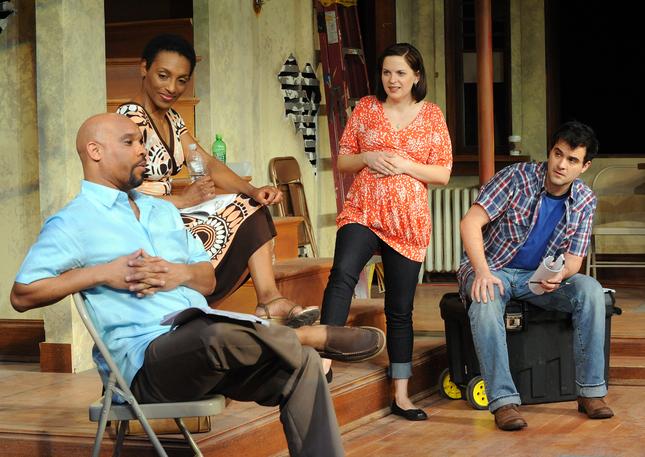‘Clybourne Park,’ a Mammoth Production
By • August 17, 2011 0 1249

Some time ago, when Woolly Mammoth Theatre first staged a production of “Clybourne Park” by Bruce Norris, it was doing something very much in the Woolly tradition. That is, a Washington premiere, a topical, ice-pick witty and emotionally pulling play by a gifted young writer which seemed to echo especially in D.C., as real as a stopped Metro escalator, even though it was set in Chicago.
Now “Clybourne Park” is back, complete with its original D.C. cast under the direction of Woolly artistic honcho Howard Shalwitz, after a successful stint in New York, and more than that, after winning a Pulitzer Prize for Norris
If you didn’t see “Clybourne” the first time around, please, please go see it—you’re in for a terrific play that encompasses ideas about how we lived yesterday, and today, in race-haunted America. Here in Washington, once known as “Chocolate City” for its long-standing African American majority population now drifting ever more towards vanilla, the themes of “Clybourne Park” resonate loudly.
Norris took his jumping point from Lorraine Hansberry’s classic 1959 play “A Raisin in the Sun” and it’s set in the same house occupied by the African American family of that play.
In “Clybourne Park” we see a white couple packing up—knick knacks, boxes, dishes and the like while the black cleaning lady looks on in the early 1950s. Soon, there’s another couple in the house, headed by a weasely, high-energy and bursting with rationalizations Rotarian named Carl and his deaf and pregnant wife. Turns out that Russ and Bev, the soon-to-be-moving couple, have sold their house to a black family and that’s got the Rotarian and the local minister fit to be tied.
This is the 1950s and Russ and Bev aren’t trying to be enlightened liberals—their real estate agent is more to blame here, and besides, the couple are more focused on their own sorrows than what might happen if black people move in, and move in, it appears, they will. Carl, the minister and Russ start to bicker, to argue, and all of the latent fears of the white neighborhood start to come to the surface like muck after a rainstorm. Carl—played with sharp and sly energy by Cody Nickell—is like a sharp-edged mouser on the hunt. He keeps coming back, talking about cultural differences, real estate values, all the racial clichés of the 1950s couched in euphemisms—“Do you ski?” he asks the housekeeper’s husband, as if that made all the difference in the world.
The second part of the play skips to the present time, same place, same house, and a reverse situation which sees a prosperous, adamantly liberal white couple about to buy the house which is part of a predominantly black neighborhood now. If that’s not a Washington story, it sure could be. The white couple are played with a kind of eager hipness, full of PC values held dearly but with a back-breaking fuzziness, by Nickell and Kimberly Gilbert, who were the couple opposing the sale in the first half.
Kevin and Lena, a black couple played Jefferson A. Russell and Dawn Ursula with great depth and edge are flying the flag of neighborhood history and tradition, which is to say black history and tradition. The issues—actually one issue—are the same: race in America and why can’t we just get along and live together or at least side by side. Because, Norris suggests, we don’t know how to talk about race, not only in our own homes, but in our day to day dealings with each other
Everyone, no matter how they dress or how cool and tolerant they are in the 21st century, walks with open wounds. If euphemism and personal tragedy carry the day in the first act, not-so-well-hidden cultural historic values and resentment emerges like grenades, in the form of jokes that are more than jokes, they’re weapons of choice.
Norris – who also wrote the Woolly Mammoth staged “The Unmentionables,” a play about how Westerners are still the elephant in the china shop in modern Africa – uses comedy to open up in slashing style old wounds and lets them bleed out.
Everyone in the play doubles up on parts, but in the first act, Jennifer Mendenhall and Mitch Hebert own not only the house but the audience, both dealing with loss and change. Mendenhall especially reminds us that she is one of Washington’s finest actresses as Bev, exasperated, bleeding inside, barely holding together with habits masquerading as normal. Hebert is like a lean, tense, electric cord of a man unable to shake off the past, thoughtless about the future.
Best to watch yourself and your fellow audience members during the course of the play, you might be thinking though and looking around—which joke should you laugh out and how loudly?
What’s so good about the actors, about Norris, about the production, is that you’re never seeing anybody as less than an authentic human being. And that’s why you look around, and that’s why “Clybourne Park” stays with you. (“Clybourne Park” will run through August 14)

